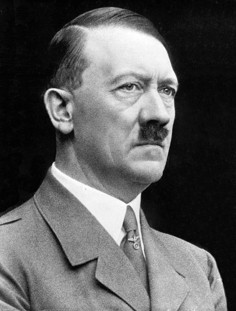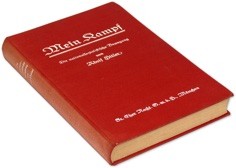
Adolf Hitler’s Mein Kampf back in German bookstores; Jewish groups ask why
Nazi leader’s notorious work has been banned for 70 years, but today a new scholarly edition goes on sale. All schools should have one, education minister says, but descendants of race Hitler’s wartime regime sought to exterminate don’t agree it should be republished
New copies of Hitler’s Mein Kampf hit bookstores in Germany today for the first time since the second world war, unsettling Jewish community leaders as the copyright of the anti-Semitic manifesto expires.
The southern German state of Bavaria was handed the copyright of the book in 1945, when the Allies gave it control of the main Nazi publishing house after Hitler’s defeat. For 70 years, it refused to allow the inflammatory tract to be republished out of respect for victims of the Nazis and to prevent incitement of hatred.

The version by the Institute of Contemporary History of Munich (IFZ) has been in the works since 2009 and aims to “deconstruct and put into context Hitler’s writing”.
Retailing at €59 (HK$495), the book looks at key historical questions, the institute said, including: “How were his theses conceived? What objectives did he have? And most important: which counterarguments do we have, given our knowledge today of the countless claims, lies and assertions of Hitler?”
German Education Minister Johanna Wanka has argued that such a version should be introduced to all classrooms across the country, saying it would serve to ensure that “Hitler’s comments do not remain unchallenged”.

But the Jewish community questioned whether it was necessary to propagate the incendiary text again.
Partly autobiographical, Mein Kampf outlines Adolf Hitler’s ideology that formed the basis for Nazism. He wrote it in 1924 while he was imprisoned in Bavaria for treason after his failed Beer Hall Putsch.
The book set out two ideas that he put into practice as Germany’s leader going into the second world war: annexing neighbouring countries to gain “Lebensraum”, or “living space”, for Germans; and his hatred of Jews, which led to the Holocaust.
Some 12.4 million copies were published in Germany until 1945, some of which can be found in academic libraries.
Charlotte Knobloch, leader of the Jewish community in Munich, said she could not imagine seeing Mein Kampf in shop windows.
Ronald Lauder, president of the World Jewish Congress, says that not only will “Holocaust survivors be offended by the sale of the anti-Semitic work in bookstores again”, but that he also failed to see a need for a critical edition.
“Unlike other works that truly deserve to be republished as annotated editions, Mein Kampf does not,” he says, arguing that academics and historians already have easy access to the text.
And even though it should be studied and German students taught about the devastating impact it had, Lauder says “the idea that to do so requires an annotated edition with thousands of pages of text is nonsense”.
“Now, it would be best to leave Mein Kampf where it belongs: the poison cabinet of history.”
Agence France-Presse

.png?itok=arIb17P0)